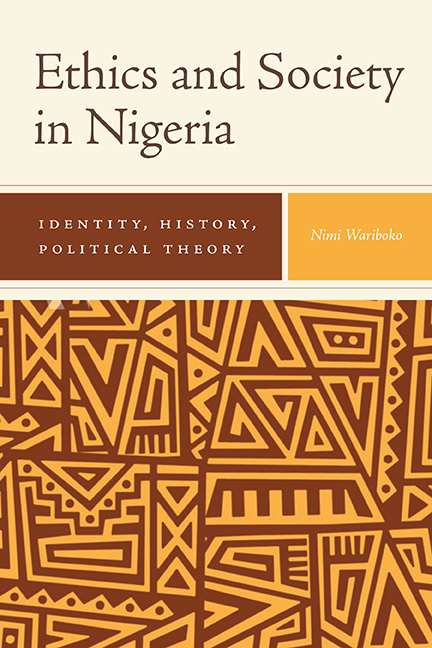Book contents
- Frontmatter
- Dedication
- Contents
- Foreword
- Preface
- Acknowledgments
- Introduction: Dead Gods, Divine Kings, and Deadly Politicians
- 1 The Emergence of the Lotus-Self: Personhood and Identity
- 2 Dead Gods and People's Revolts: Political Theory in Religious Acts
- 3 The Divine King and His Five Bodies: Living History and the Logic of Interreligious Dialogue
- 4 Governance and Deadly Politicians: History as Cultural Criticism
- 5 History without Force: Finding Present Space and Place of Time
- 6 Constructing Nigeria's Greatness: Neglected Paths of Community, Narratives, and Care of the Soul
- 7 Mythos, Virtues, and National Transformation: The Search for a Standard of Citizenship Moral Behavior
- 8 African Traditional Religion and Critical Theory: A Framework for Social Ethics
- Notes
- Bibliography
- Index
4 - Governance and Deadly Politicians: History as Cultural Criticism
Published online by Cambridge University Press: 03 September 2019
- Frontmatter
- Dedication
- Contents
- Foreword
- Preface
- Acknowledgments
- Introduction: Dead Gods, Divine Kings, and Deadly Politicians
- 1 The Emergence of the Lotus-Self: Personhood and Identity
- 2 Dead Gods and People's Revolts: Political Theory in Religious Acts
- 3 The Divine King and His Five Bodies: Living History and the Logic of Interreligious Dialogue
- 4 Governance and Deadly Politicians: History as Cultural Criticism
- 5 History without Force: Finding Present Space and Place of Time
- 6 Constructing Nigeria's Greatness: Neglected Paths of Community, Narratives, and Care of the Soul
- 7 Mythos, Virtues, and National Transformation: The Search for a Standard of Citizenship Moral Behavior
- 8 African Traditional Religion and Critical Theory: A Framework for Social Ethics
- Notes
- Bibliography
- Index
Summary
History is the stories of the present. Social-ethical analysis under the hammer of reconstruction of social-ethical identity must subject today's stories to a process of radical questioning and reawakening.
Cultural criticism of the present is not an alternative to historical writing, but is an alternative, ticklish way of expressing historical writing.
Unbearable Governance Style
Unbearable poverty. Excruciating suffering. Unyielding trauma. Postcolonial incredible. Power vulgarity. These are some of the morbid symptoms or effects of governance in Nigeria, the choking string of unutterable treason of the nation's depraved ruling class. In front, Nigerians see only immiseration; in back, they have experienced sixty years of deprivation; on the right, they face unending corruption; on the left, they witness the all-pervasive anomie; and at the center, Nigerians see nothing but a black hole. Governance in Nigeria is a storm blowing out of the people's patrimony, a destructive wild wind that spreads doom and gloom across the regions, piling ruin upon ruin, wreaking havoc on the ethics and morals of society.
Since 1960, the nature of governance has drastically changed for the worse. In the mid-1960s when the five army majors struck in a coup d’état and overthrew the civilian government of Prime Minister Tafawa Belewa, governance had, perhaps, three possibilities. Governance somewhat represented an uncomplicated embodiment of the citizens’ hope for their socioeconomic uplift, or an uncomplicated embodiment of corruption, or the uncertainty of part good and part corruption. Now we have only two options: sociopathic corruption or the uncertainty of whether corruption is going to treat the citizens with divine or demonic impunity. Chris Abani, in his novel GraceLand, captures something about this shift in the nation's morality in a dialogue between the protagonist Elvis Oke and his friend Redemption. In the 1960s, when the characters were younger, the movies had three archetypes: John Wayne, the ur -character for uncomplicated goodness; the Actor, always part villain and part hero; and the Bad Guy, the embodiment of malicious evil. By the early 1980s, things have changed, the movies had changed, mirroring the changes in scale of corruption and anomie in the country. To Elvis this was all confusing until Redemption explained, “Now dere is only Bad Guy and Actor. No more John Wayne.”
- Type
- Chapter
- Information
- Ethics and Society in NigeriaIdentity, History, Political Theory, pp. 73 - 97Publisher: Boydell & BrewerPrint publication year: 2019



